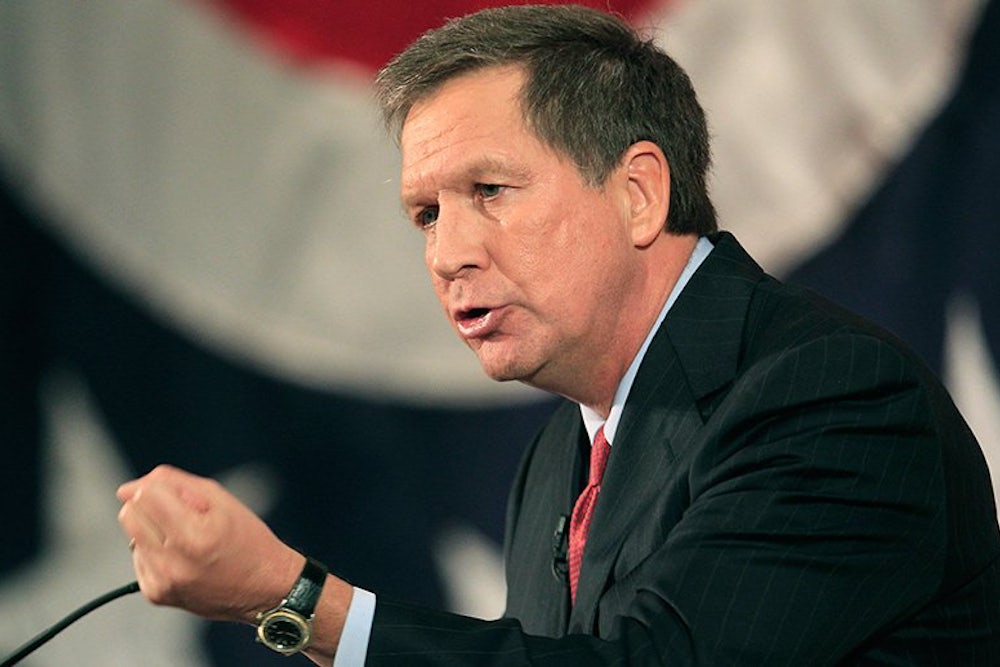Ohio’s governor John Kasich certainly won't be president, nor even receive the Republican party’s nomination in 2016. But if Kasich does throw his hat into the increasingly packed Republican primary ring (as some sources suggest he intends to do), the long-term outcome for American politics could be even better than a hypothetical win. This is because, unlike his Republican competitors, Kasich takes Christian politics very seriously.
Within the lore of conservative Christian politics, there is a line of questionable thinking regarding state-funded welfare that is far more recent than its proliferators make it seem. The story goes like this. While Jesus Christ undoubtedly promoted (if not commanded) charity and generosity toward the less-fortunate, He never said that the state should be the vehicle of these virtues. Further, the tale continues, because taxes are involuntary and welfare is funded with tax revenue, welfare doesn’t count as morally meaningful charity, which is what Jesus intended to inspire with His preaching on the poor. Thus, we are led to conclude, support for poor and vulnerable people should be transmitted voluntarily through the community, thanks to the good graces of generous individuals. Echoes of this reasoning resound in the anti-welfare rhetoric of Republican frontrunners from Rand Paul to Rick Perry.
It’s a good story if you want to avoid supporting social insurance programs without overtly sacrificing your Christian street cred. Unfortunately, it’s also theologically incoherent. First, it isn’t clear why politicians, whose job entails the just governance of citizens or subjects, should consider support for the poor an individual task. If Christian wedding cake bakers should be permitted to exercise the fullness of their Christian conscience in their work, why wouldn't politicians? Moreover, when politicians do seek to support the poor, it need not be solely under the banner of charity: Justice and order are fine enough reasons to make sure all people are stable and secure. Lastly, the right-wing, anti-welfare narrative is alien to historical Christianity, contemporary global Christianity, and the teachings of Jesus Himself. Candida Moss, an author and professor of Early Christian studies at Notre Dame, explained to me in an interview, “Jesus hasn't always been viewed as an anti-taxation figure. His famous statement about ‘rendering to Caesar what is Caesar’s, rendering to God what is God's’ can easily be read as indicating that Christians should pay taxes. This idea that Christians shouldn't pay taxes is remarkably novel.”
When hawking a story that creaky, politicians must maintain a unified front, lest the disparity between right-wing zeal for Christian teachings on sexuality versus Christian teachings on poverty expose opportunism. Yet John Kasich, for whatever reason, did not get the memo.
Explaining his decision to expand Medicaid coverage in Ohio pursuant to the Affordable Care Act, Kasich told reporters in 2013 that “when you die and get to the meeting with Saint Peter, he’s probably not going to ask you much about what you did about keeping government small. But he is going to ask you what you did for the poor. You better have a good answer. " For linking the extension of healthcare coverage to some 275,000 vulnerable Ohians with his Christian principles, Kasich received scorn from flustered rightwingers. Writers from RedState, The National Review, and The Wall Street Journal all converged to offer a collective sneer at Kasich’s pro-poor Christian politics, and it seems that Kasich has kept the free-market right rankled enough to retain their censure to this day.
At a Wednesday dinner with a slew of right-wing thinkers and writers, Kasich held firm on Medicaid expansion, remarking during a tussle with National Review’s Avik Roy that “Maybe you think we should put [Medicaid recipients] in prison. I don’t. I don’t think that’s a conservative position. Because the reality is, if you don’t treat the drug-addicted and the mentally ill and the working poor, you’re gonna have them and they’re gonna be a big cost to society.” Earlier this month, an interview with Kasich featured in a National Journal profile of the governor featured his belief that “the conservative movement—a big chunk of which is faith-based—seems to have never read Matthew 25,” by which he refers to the New Testament sequence wherein Christ commands His followers to care for the naked, sick, foreign, hungry, and imprisoned. For Kasich, the fact that the state has an obligation to care for the vulnerable is nothing more than an outgrowth of this Christian message. So far, that position has been tough for fellow right-wingers to contravene.
Perhaps this is because Kasich’s reading of the Gospel is natural and intuitive. He derives a powerful ethical interest in caring for the poor from passages that inarguably display as much. For Christian conservatives who value Biblical literalism, such seemingly unmediated reading of the Bible should offer an obvious political guide. But caring for the poor and ordering society to support all members to a level of basic dignity are not free-market measures, and thus Kasich’s simple-hearted reading of Matthew 25 appears to have won him few friends among Republican elites. For this reason, his chances of pulling off any national wins are slim-to-none.
Kasich should still run. His sturdy brand of Christian politics belongs in a nation that has, for the greater part of the last century, drowned in rhetoric that paints Christianity and capitalism as natural allies, despite all evidence to the contrary. If Kasich runs in the primaries, his opponents will have to reckon with his Christianity in debates and campaign speeches to compete for the coveted religious right. The more that free-market apologists nursing Christian side interests try to explain the illusive continuity between their economics and their faith, the more, I suspect, that tenuous linkage will unravel. If nothing else, Kasich stands poised to puncture longstanding assumptions that connect anti-welfare capitalist interests to the votes of well-meaning Christians. Exposing the gap between free market economics and straightforward Christian politics may serve genuine Christian politics better than a Kasich presidency itself.
